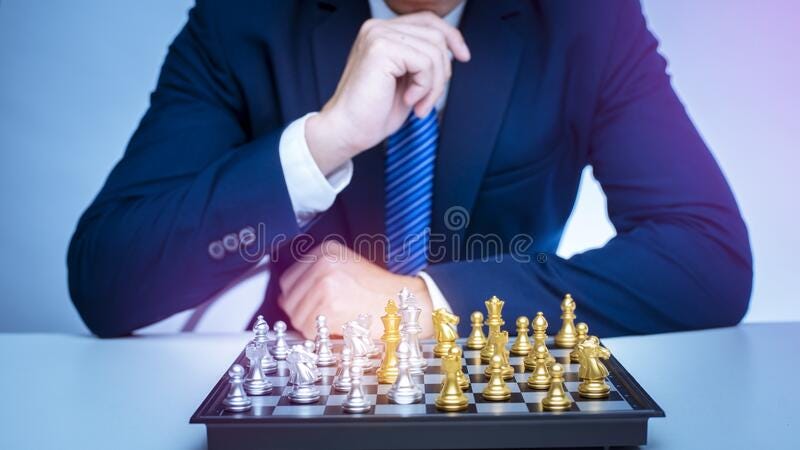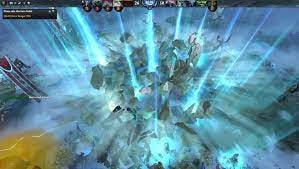Gaming as Management Training
Training Software Engineering Managers with Competitive Toxic Team Based Online Video Games
Note: The comments section on this post are as good if not better than the main post. So make sure to read them as well.
Chess
When people discover I used to be a chess player they get excited, they’ll say things like “makes sense, this is why you’re into math and programming now and yeah you probably don’t make dumb decisions since you can think ahead”.
I’ve spent more time during my teenage years studying chess than I did studying for school. I never quite went pro especially after I started undergrad engineering and found a girlfriend. But the above comments make me lol, chess is kind of like the SAT - I didn’t get better at tech leading teams at Microsoft and Graphcore by playing chess.
Chess is a popular metaphor in corporate America, something about planning ahead to outplay your opponents is an appealing narrative. You are the CEO, your team are your pieces, armed with the Gartner technology report, you are unstoppable.
For the most part while you’re playing chess you can only experience a finite set of emotions. You can be surprised by your opponents opening. For the midgame you’re either feeling slowly more confident or slowly fall into despair and for the endgame you’re hyper-focused trying to win or see where you can find a draw.
However, chess is not a team game and the downfall of most software projects is not competition but the team itself. Corporations are not in service of their customers, they are in service of their employees. Employees with chaotic wants, needs and constraints — most of which are totally opaque to management.
So if chess doesn’t capture the spirit of business, what does?
DOTA
DOTA (Defense of the Ancients) is a 5v5 competitive team based multiplayer game captures some of the pitfalls teams fall into. You and your teammates need to each pick one of over a 100 unique heroes that synergize well together so you can destroy the enemy Ancient.
I’ve played a few thousand hours of DOTA and am happily in the top 85th percentile of players globally. It’s an amazing game with endless variety, real time tactical execution and long term strategic planning.
This is a decent 10 minute video summary of how DOTA works
You may opt for a quick assassination strategy where you pick off key enemy targets. Or maybe a flashy team fighting strategy where you stun the entire enemy team at once. You can choose to avoid fighting entirely by playing an economic game, collecting resources faster than your opponents or distract the enemy team while you destroy their buildings.
Regardless of what you pick it’s very difficult to execute on any strategy without some amount of coordination with your teammates.
Which brings us to the main point of this post
Leadership
If you can convince 4 people you’ve never met to trust you for an hour, help each other overcome a difficult opponent, then you have what it takes to be a leader in the real world
Management seems to be one those skillsets without a clear study roadmap. Generally you’re a successful and consistent independent contributor, your scope increases a bunch and it’s critical for the business, you hire a bunch of people and you manage them.
But being a good manager is a tangential skillset to being a good engineer, sure you can read a bunch of management books but there’s no substitute to learning on the job.
But that means you are going to make tons of mistakes which will make impact peoples lives until you get better. You need lots of iterations and quick feedback loops which are hard to come by in the real world but easy in a game.
So in the same way the military does scenario driven simulations we can use
DOTA as the ultimate management training
DOTA is notoriously toxic, players get upset especially when they’re losing (my girlfriend can attest to this) but few things feel as good in life as executing on a DOTA fight perfectly. Doing so reliably requires exceptional leadership skills so there’s a lot we can learn.
DOTA Lessons for Managers
Fixed resources
Shared resources lead directly to toxicity, in DOTA experience and gold are shared resources that usually need to be directed towards your carry (heroes that become better in longer games). But if your carry is bad then this is a frustrating experience, you’ll want to take your carry’s resources which will make them even angrier and the toxicity feedback loop continues.
I can’t remember hearing anyone say they like stack-ranks, ideally the scope and success of teams need to grow rapidly so the pie keeps increasing and fixed sum games can’t be played. Time, attention, salaries are fixed resources - projects are not.
Losing
It’s easy to be positive when you’re winning and it’s hard to be positive when you’re losing. Letting a negative mindset take over you while you’re losing will make you launch into all sorts of passive aggressive comments towards your teammates who will dislike and distrust you which creates a reflexive loop where you’re more and more likely to lose.
If you’re on a losing streak and easily irritable, you’re burnt out. Take a break, go for a walk outside and maybe play a different game for a bit.
Every team needs a chief meme officer they create a strong in-group identity by undyingly supporting their own team and playfully throwing shade at their opponents.
Do I suck? No! It’s my team
The worst and most toxic players always think they’re the best player. Even if that were true (usually it is not), blaming your team is an excuse that prevents you from stepping up. Would a better player salvage the situation? If every team you’ve ever been in on is bad, then you’re weakest link.
Communication
Macro level communication as in “here is the plan” is very helpful, micromanaging is irritating. Almost universally if you micromanage someone they will tell you to “respectfully fuck off” especially if you’re not paying them.
In the heat of the moment it’s very difficult but much more useful to give a plan. Saying “Stop dying guys” or “We are not selling enough” is not actionable. This kind of feedback often showcases a lack of imagination on the side of the leader. Try instead “We need magic immunity vs their shaker” or “Why are we losing, what are we missing?”
Complexity
Everyone has a plan until they get punched in the mouth - Mike Tyson
Complex plans are brittle, in real time if there’s a hitch, someone mistimes their spell usage and the whole plan falls apart. Simple plans are modular and reliable and allow for emergent complexity via composition. Teammates can fit their plans and strengths more easily into simple plans.
Credibility
10xers exist, if a player is 1v5’ing the enemy team, listen to them and see how you can help them. Accept that they are better and you have more to learn from them than they do from you.
Your teammates will listen to you if they perceive you as the best player or the best shot-caller on the team
And the corollary of that rule, is crybabies get muted.
Feedback
Negative feedback needs to be framed to the whole team and positive to the individual and the team
Trusting your teammates even if it results in a bad play in the short term is still the best long term plan
After a negative encounter, laughing it off while analyzing team level mistakes is invaluable, picking on a specific teammates mistakes no matter how egregious is not a good idea. If your entire ads system goes down, telling the sleep deprived engineer why did you take so long to figure out the bug is not useful, asking them what they would have done differently is.
Positive feedback needs to be specific: “Holy shit man, that Echo Slam was insaaaane”
Nerves
Some people can’t be saved, a DOTA meme is Tiny airlines where tilted (cartoonishly angry) players will pick a hero called Tiny and toss you over and over again to your enemies to your death for 40 minutes straight. Accept that sabotaging teammates will happen sometimes and be thankful that it only lasts 40 minutes.
Nerves not skills is the true bottleneck. Nothing exemplifies this more than techies, a hero that can instantly kill you with bombs from anywhere on the map and routinely makes games drag out to 90 min+. Techies players are trying to deplete a different resource from the usual DOTA one, your sanity.
Emotional Support
If someone is apologizing a lot for misplays, they are often having a hard time in real life. Be extra supportive to these players and they will be in a much better mood if they don’t feel judged by their team and hopefully play better.
People are different, some will ask for constant feedback some won’t
It’s often not your enemies or competition that are outplaying you but your teammates not trusting each other. Self sacrifice is the most iconic form of building trust, no-one forgets it, even after thousands of years.
Next steps
If you’re a gamer and manager I’d love it if you could reach out and let me know if this article resonated.
If you enjoyed this you’ll probably enjoy
My talk on Youtube on How Games Teach where I go over tons of examples of games that do the best job I’ve seen of any medium at teaching you logistics, factory management, diplomacy and much much more
My beginner’s guide to Dungeons and Dragons will show you my DnD is the ultimate game to coach you on how to become a better storyteller
Why games not algorithms will help us build intelligent systems - see my guide on creating your own Reinforcement Learning environments with Unity ML agents
Games are the most efficient teaching medium we have today.
Cats learn how to hunt by playing. We’re the same, we like the sun, we like hugs but we differ in how we over-intellectualize what we consider to be valuable.
As for me, after 15 years I’m taking a break from competitive strategy games for a while. Hopefully I’ll find something I’ll be as excited about and if I do I’ll be sure to write about it.
Acknowledgements
Thank you Daniel Bourke for reading and sharing heartwarming stories about what games taught him throughout his life., these kinds of stories are why I started writing in the first place. Vera for a careful analysis of toxicity and leadership in DOTA vs the real world with lots of specific examples. Diamond Bishop for long detailed feedback reflecting on his own management and gaming experience. CharonAbol for picking the catchy title I ended up using which was a much needed improvement over “Toxicity Exposure”.






Mark, fantastic piece. It’s triggered some thoughts. I’ll write them down.
I played RuneScape and ran Australia’s best Capture the Flag Call of Duty team all throughout high school. I’d go to school 8-3, play sport 3-5 and then play computer games until midnight.
RuneScape taught me economics and how to use a keyboard. In game, there was a field you could stand in and buy items from other players around the world. That’s where I started my first (virtual) business. The idea was simple, trade other players, buy items low, sell for more. You’d often have to switch which item you were flipping to account for supply and demand of the game. And because your way of selling was through a keyboard, typing “Selling Obby Capes $250k – Trade 0 Crazy 0" over and over again, my fourteen year old fingers got fast at typing.
Running a Call of Duty team taught me organisational skills, leadership skills, communication skills, strategy skills. I was never the best player (my friend Nick was a freak, as in, freakishly good) but I was the best communicator by far. I’d get in touch with other teams around Australia and we’d organise matches with each other (playing other countries would be a disadvantage due to ping). I remember getting home from school on a Monday and spending hours planning out a strategy to run for the weekend’s upcoming match. Nick hold the middle, Matt and Will go down the right, Chris and I will hold the back and cut off the left flank. I’d run through it with the team on Tuesdays and then we’d spend the rest of the week practicing before the actual match.
The benefit of video games was: a fast feedback loop. Or another term I’ve just thought of: tinkering at scale.
If the items I was selling were overpriced, I’d have no buyers.
If the plans I’d made for the Call of Duty match didn’t work we’d get slayed in public games (games with random opponents usually of lower skill than actual teams) let alone in competition.
Of course, not all of the skills translate directly to the real-world. But the benefit of RuneScape and Call of Duty was that each digital player had an actual human on the other side. Which meant many of the social dynamics did transferred directly (as you’ve discussed).
My ears rang with people telling me video games were a waste of time whilst I was playing them. And while now I’d agree with them on some level (you don’t need video games but the real world needs you), they’ve been some of my greatest teachers.
I’d also argue a benefit for working any kind of role with a high flow of people, especially any kind of customer service.
Working at Apple Retail taught me how to view things from a customer’s point of view. Seeing a new customer every 10-minutes provided a grand opportunity to learn how to befriend (people like to buy things from their friends) and help someone solve their issues in a short period of time. Driving Uber gave similar opportunities, a new person every 10-minutes. You can read all the How to Win Friends and Influence People books you want but until you try what you’ve read 1000x, you’ll never know.
Now I work in tech, I’ve noticed a big disconnect between what an engineering team might think a person might want versus what they actually need.
I’m a big fan of bringing the value of what video games provide not only to software engineering teams but education as well.
How?
I don’t quite know yet.
But something I do know: the best teachers are entertainers, education comes as a bonus. Curriculum designers could take some cues from game designers.
I never thought about DOTA and other one-time teams as a good breeding ground for managers. The nature of the relation makes it hard for teams to form up, especially since the goals of the players are often misaligned. E.g. one player might want to attempt to manage the other players to increase the probability of winning, but other players might just want to play the game without try-harding that much.
However, I think that games with guild systems are where the true manager might be born. EVE online, WoW, etc. have guilds with hundreds of members that need coordination in achieving their goals. I feel like they are much closer to how the real world teams look like (they are long-term, they have a hierarchy, they have various projects and they assume that different people might have different goals). It would be interesting to train managers in games like these to see how well they can handle various situations. You can also simulate various kinds of stress for them, e.g. by attacking their guild, by challenging their leadership etc.